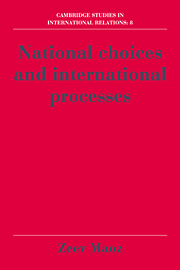Book contents
- Frontmatter
- Contents
- List of figures
- List of tables
- Preface
- 1 Toward a theory of international processes
- 2 Foreign policy decision making: assumptions and characterization of the approach
- 3 The inputs of decision making: identification and conceptualization
- 4 The essential mathematics of inputs
- 5 Models of the decision process
- 6 A formal characterization of decision processes
- 7 A theory of foreign policy decision making
- 8 The analysis of international outcomes
- 9 The evolution of international processes
- 10 Individual preferences, national choices, and international systems
- References
- Name Index
- Subject Index
9 - The evolution of international processes
Published online by Cambridge University Press: 05 February 2012
- Frontmatter
- Contents
- List of figures
- List of tables
- Preface
- 1 Toward a theory of international processes
- 2 Foreign policy decision making: assumptions and characterization of the approach
- 3 The inputs of decision making: identification and conceptualization
- 4 The essential mathematics of inputs
- 5 Models of the decision process
- 6 A formal characterization of decision processes
- 7 A theory of foreign policy decision making
- 8 The analysis of international outcomes
- 9 The evolution of international processes
- 10 Individual preferences, national choices, and international systems
- References
- Name Index
- Subject Index
Summary
INTRODUCTION
The primary objective of theories in international politics is to account for the evolution of some aspects of the relations among states over time. So far, our discussion of international outcomes has ignored completely the time dimension. The focus of this chapter is on how international processes evolve over time. The discussion of international outcomes in the previous chapter serves as the basis for reviewing two general approaches to the evolution of international processes: the ad hoc approach and the strategic approach. The essence of the ad hoc approach is that national decision makers are generally myopic in their approach to internal problem solving. Their reactions to environmental changes are determined primarily by the outcomes of their previous decisions and by their perceptions of the immediate situation they are facing. The strategic approach, on the other hand, asserts that decision makers are pursuing long-range and well-defined strategies, and that their behavior at any given point in time is a result of general strategies. Each of these approaches provides a seemingly different image of international processes. I attempt to explore the implications of these images for the study of international politics, in general, and international processes, in particular.
This chapter lays the final, and most central, brick in the theory of international processes. The focus of the discussion in previous chapters has been on the immediate conditions that account for national decisions or on the immediate factors affecting the processes by which national choices are transformed into international outcomes.
- Type
- Chapter
- Information
- National Choices and International Processes , pp. 463 - 530Publisher: Cambridge University PressPrint publication year: 1990



